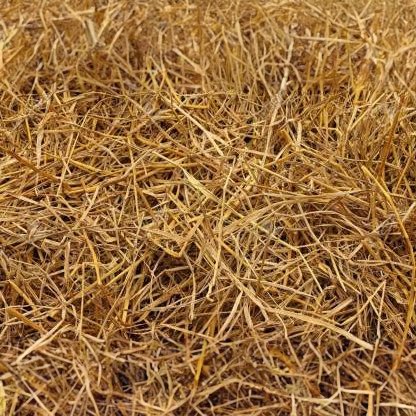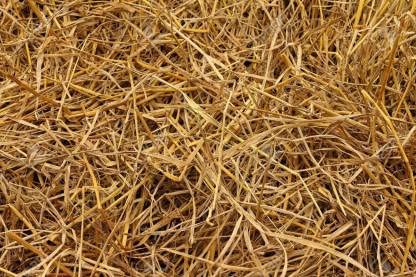Paddy & Rice Straw Mulch: Ideal for Gardens, Beds, Vegetables, Flowers, Fruits, Pots, Trees, and Shrubs – Available in 500GM, 1KG, and 2KG Packs – Perfect for Straw Mulching
₹99.00 – ₹199.00
Cash On Delivery Option Available at Checkout
- Satisfaction Guaranteed - Free Replacement*
- Dispatched in 1-2 Days, Ships in 3-5 Days**
Paddy straws or rice straws are versatile organic materials that serve as excellent mulch for various gardening purposes. Whether you’re tending to roses, vegetables, fruits, or a variety of other plants in your garden, these mulches provide numerous benefits. Available in convenient packages of 500g, 1kg, and 2kg, they’re suitable for small to medium-sized gardening projects.
- Paddy Straw or Rice Straw Composition: Paddy straw or rice straw are natural byproducts of rice cultivation. They consist of dried stalks and leaves of the rice plant, which are finely chopped and processed to form mulching material. These straws are lightweight yet durable, providing an effective barrier against weeds while allowing air and water to penetrate the soil.
- Benefits for Roses, Garden Beds, Vegetables, Flowers, and Fruits:
- Weed Suppression: Paddy straw or rice straw mulch create a dense covering that inhibits weed growth, ensuring that your roses, vegetables, flowers, and fruits have access to essential nutrients without competition from unwanted plants.
- Moisture Retention: By forming a protective layer over the soil, these mulches reduce moisture evaporation, keeping the root zones of your plants consistently hydrated, especially during hot and dry periods.
- Soil Temperature Regulation: Paddy straw or rice straw mulch act as insulation, moderating soil temperatures by keeping them cooler in the summer and warmer in the winter, which promotes healthier plant growth.
- Organic Matter Enrichment: As the mulch gradually decomposes, it adds organic matter to the soil, enhancing its fertility and structure, thus creating a more hospitable environment for plant roots.
- Erosion Control: The fibrous nature of paddy straw or rice straw helps stabilize soil, preventing erosion caused by wind and water runoff, particularly on sloped areas.
- Suitable for Various Garden Elements:
- Pots and Containers: Paddy straw or rice straw mulch can be used in pots and containers to provide insulation and moisture retention for potted plants, promoting healthier growth.
- Trees and Shrubs: These mulches are ideal for creating protective rings around the base of trees and shrubs, preventing weed growth and conserving soil moisture.
- General Beds: Whether you have flower beds, vegetable patches, or general landscaping beds, paddy straw or rice straw mulch offers a versatile solution for maintaining soil health and plant vitality.
- Application and Usage:
- Spread a layer of paddy straw or rice straw mulch evenly around the base of plants, ensuring coverage without smothering emerging seedlings.
- Maintain a thickness of approximately 2-3 inches to maximize weed suppression and moisture retention benefits.
- Replenish the mulch as needed to maintain the desired thickness, especially after heavy rainfall or decomposition over time.
- Environmental Considerations:
- Paddy straw or rice straw mulch are eco-friendly options for gardeners seeking sustainable alternatives to synthetic mulches, as they are biodegradable and contribute to soil health.
- By utilizing agricultural byproducts like paddy straw or rice straw as mulch, you are participating in a circular economy that minimizes waste and supports local farming communities.
Conclusion: In summary, paddy straw or rice straw mulch are invaluable additions to any garden, offering a range of benefits for plant health, soil quality, and weed management. With their convenient packaging options and versatile applications, these organic mulches are the perfect choice for gardeners looking to enhance the beauty and productivity of their outdoor spaces while adopting sustainable gardening practices.
Frequently Asked Question
Is rice straw good for soil?
Yes, rice straw is beneficial for soil health. When incorporated into the soil, rice straw improves its structure, enhances water retention, and promotes nutrient cycling. Additionally, it encourages microbial activity, which aids in breaking down organic matter and releasing nutrients for plant uptake. Overall, using rice straw as a soil amendment can contribute to improved soil fertility and sustainability in agricultural systems.
Can rice straw be used as fertilizer?
Yes, rice straw can be used as fertilizer due to its high nutrient content, including nitrogen, phosphorus, and potassium. When incorporated into the soil, it decomposes gradually, releasing these nutrients over time and improving soil fertility. Additionally, its decomposition process contributes to soil organic matter, enhancing soil structure and moisture retention. However, it’s essential to properly manage the application of rice straw to avoid potential drawbacks such as nutrient tie-up or nitrogen immobilization.
How long does straw last in a garden?
Straw typically lasts in a garden for about one growing season, which is roughly six to eight months. Its durability depends on various factors such as weather conditions, moisture levels, and the type of straw used. Over time, straw will gradually decompose, providing nutrients to the soil and helping to improve its structure. However, it may need to be replenished or replaced annually to maintain its effectiveness in weed suppression and moisture retention.
How much straw do I put in my garden bed?
The amount of straw you put in your garden bed depends on several factors such as the size of your bed, the type of plants you’re growing, and your local climate. As a general rule of thumb, aim for a layer of straw about 2 to 4 inches thick. This thickness helps to suppress weeds, retain moisture, and regulate soil temperature. However, be cautious not to smother your plants by adding too much straw. Start with a moderate layer and adjust based on your specific garden needs.
What are the advantages of paddy straw mulching?
Paddy straw mulching offers several advantages in agricultural practices. Firstly, it helps conserve soil moisture by reducing evaporation, leading to improved water retention in the soil. Secondly, it acts as a natural weed suppressant, reducing the need for chemical herbicides and manual labor. Additionally, paddy straw mulch gradually decomposes, enriching the soil with organic matter and nutrients, which promotes healthier plant growth. Lastly, this mulching method also aids in preventing soil erosion, especially in sloped or vulnerable areas, contributing to overall soil conservation efforts.
Where can paddy straw be used?
Paddy straw, also known as rice straw, can be used in various ways. It is commonly utilized as animal fodder due to its high cellulose content and digestibility for ruminants like cattle and goats. Additionally, paddy straw can be employed as a substrate for mushroom cultivation, providing an ideal environment for mushroom growth. It’s also used in organic farming as mulch to retain soil moisture and suppress weed growth. Moreover, paddy straw can be converted into biofuels through processes like anaerobic digestion or pyrolysis, offering a renewable energy source.
| Weight | N/A |
|---|---|
| Dimensions | N/A |
| Size: | Pack of 500gm, Pack of 1 KG, Pack of 2 KG |









